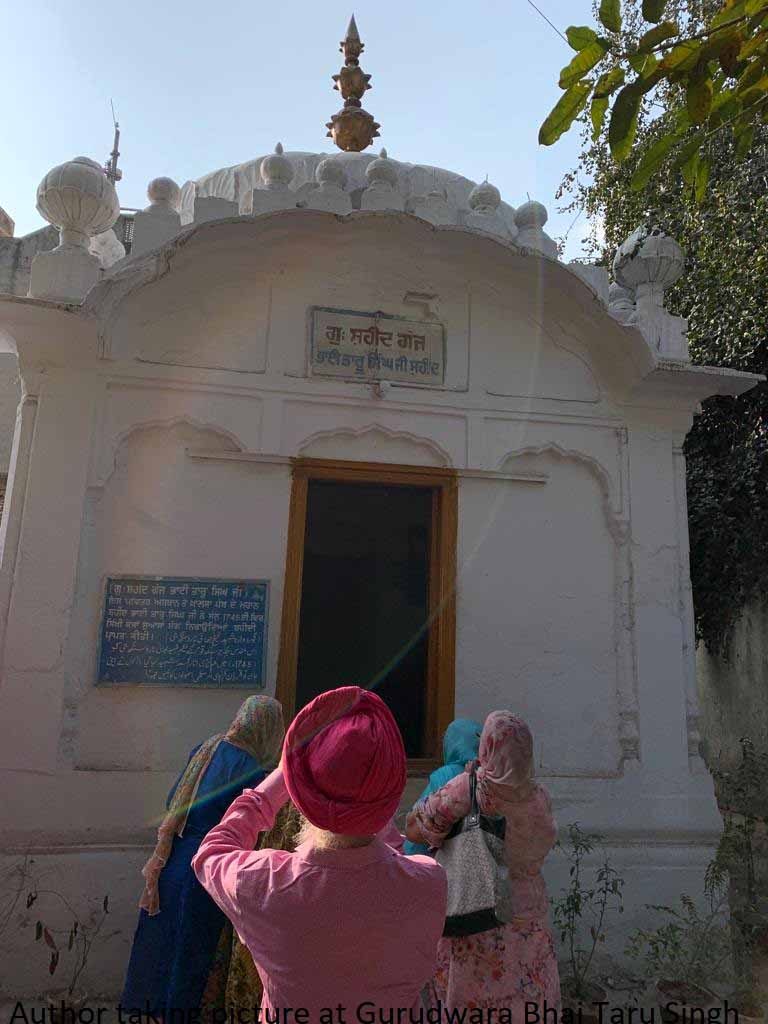Bhai Taru Singh -martyr who sacrificed life at the altar of unshorn hair
![On the occasion of the martyrdom day of Bhai Taru Singh, the spiritually inclined author Bhupinder Singh Houston yearns for a rekindling of the spirit of Sikhism by keeping unshorn hair and remaining steadfast to the commitment to one’s faith as challenges of modernity and peer pressure dissuade a section of the next generation of the Sikhs away from it. A BEAUTIFUL POEM IN BENGALI BY NOBEL LAUREATE POET RABINDRANATH TAGORE describes Bhai Taru Singh’s heroism, courage and supreme sacrifice. A few […]](https://www.theworldsikhnews.com/wp-content/uploads/2020/07/Bhai-Taru-Singh-j-360x266.jpg)
On the occasion of the martyrdom day of Bhai Taru Singh, the spiritually inclined author Bhupinder Singh Houston yearns for a rekindling of the spirit of Sikhism by keeping unshorn hair and remaining steadfast to the commitment to one’s faith as challenges of modernity and peer pressure dissuade a section of the next generation of the Sikhs away from it.
A BEAUTIFUL POEM IN BENGALI BY NOBEL LAUREATE POET RABINDRANATH TAGORE describes Bhai Taru Singh’s heroism, courage and supreme sacrifice. A few generations back many Bengalis had read the poem Tagore wrote, and today even the Sikhs don’t know about Bhai Taru Singh, despite the fact that he gets mentioned in our daily congregational Ardas (prayer). The degree of suffering that he underwent is mind-boggling. That is why telling and remembering the story of Bhai Taru Singh is so important if we are to understand the history of Sikhs.
So, let us start with a tour of the once-walled city of Lahore by choosing to head in the opposite direction of Delhi Gate. There is the Shaheedganj Gurdwara, the place where over 10,000 Sikhs were butchered in a week’s time by the butchers of Lahore on the orders of the Afghan governor Yahya Khan. Their bodies were thrown in a nearby well. That well is now known as Shaheedi Khoo-Well of the martyrs. Near the Shaheedganj Gurdwara is the spot where Bhai Taru Singh was executed on June 09, 1745. The memorial there is known as Gurudwara Shaheed Bhai Taru Singh.
BHAI TARU SINGH
When the Pathans brought them chained
All in calm they remained
The captive Sikhs -thought at Shahigunj town
With the comrades’ blood the soil was brown
Says the Nawab, “Look Taru Singh
I want to forgive you without misgiving.”
Says Taru, “Why for me so much slight?”
Nawab says, “A great warrior you are
That you proved in your fight;
So, to you I bear no anger;
Only I beg of you the gift of your Beni*
And you will be spared harm any.”
Taru replied, “I owe you as your mercy’s nominee;
So, offer a bit more, my head with my Beni.”*Poet’s Note: To shave off religion is as good as forsaking religion for a Sikh. *Beni in Bengali means the coiled hair the Sikhs keep.
There is a line from Ardas where we remember those who stood firm in their faith as:
“ਜਿਨ੍ਹਾਂ ਸਿੰਘਾਂ ਸਿੰਘਣੀਆਂ ਨੇ ਧਰਮ ਹੇਤ ਸੀਸ ਦਿਤੇ, ਬੰਦ ਬੰਦ ਕਟਾਏ, ਖੋਪਰੀਆਂ ਲੁਹਾਈਆਂ,……”
Ponder over the deeds of those brave Sikh men and women who ‘gave’ their heads but did not surrender their Sikh religion; who were cut to pieces -limb by limb, who got their scalps removed…yet did not relinquish their faith.”
“Jinaa Singhaa Singhneeaa” Is in the remembrance of those who laid down their lives for their faith, as in Shaheedganj.
“Bandh Bandh Katai” Is in the remembrance of the sacrifice of Bhai Mani Singh.
“Khopreeaa Lahaeeaa” Is in the remembrance of the sacrifice of Bhai Taru Singh.
Bhai Taru Singh was a young farmer in village Poohla, Amritsar District, who was known for providing shelter and food to all those who were fleeing Afghan persecution. In those days the authorities in Lahore had a lot of informers, and a spy from Jandiala named Akil Das, also called Harbhagat informed the governor of the Punjab -Zakariya Khan, that Taru and his sister were providing food to Sikh fighters hiding in a nearby forest. They were, allegedly, part of a plot to overthrow the governor.

Zakariya Khan asked, “From where do the Sikhs obtain their nourishment? I have debarred them from all occupations. They realize no taxes. They do not farm, nor are they allowed to do business or join public employment. I have stopped all offerings to their Gurdwaras, their places of worship. No provisions or supplies are accessible to them. Why do they not die of sheer starvation?”
Harbhagat replied; “There are Sikhs in this world, who would not eat until they have fed their brethren. They may themselves go without food and clothing but cannot bear their comrades’ distress. They would pass the winter by the fireside and send them their own clothes. They would sweat to grind corn and have it sent to them. They would do the roughest chore to earn a small wage for their sake. They migrate to distant places to eke out money for their brothers in exile.”
“My hair is inseparable from my scalp.”
Zakariya Khan decided to teach the Sikhs a lesson.
At the orders of Zakariya Khan, both Bhai Taru Singh and his sister were arrested and brought to Lahore. His sister was released after villagers raised money for her release, and after promising never again to assist strangers.
But Taru Singh, 25 years old, was made of firmer stuff and refused to apologize for feeding those in need. He was presented before the governor, and he defiantly greeted him with the Sikh salutation: “Waheguru Ji ka Khalsa, Waheguru Ji ki Fateh.” On hearing these words the governor went into a rage and as was the practice he ordered that Taru either become a Muslim or would be punished. If he refused to become a Muslim, he would be executed. Bhai Taru Singh Ji had taken Amrit -baptism to be part of the Khalsa order, from Bhai Mani Singh Ji and was really inspired by him and stirred by his sacrifice in 1737. On hearing this he retorted: ‘Why must I become a Muslim, do they never die?’
“Even if I were offered the kingship of the whole world and the beauties of paradise, I will not barter my faith.”
Next, Zakariya Khan upped the ante by offering a high position with the government and marriage with a beautiful girl from the royal Mughal family, if he embraced Islam. Bhai Taru Singh refused to give up his faith. He told Governor Zakariya Khan, “Even if I were offered the kingship of the whole world and the beauties of paradise, I will not barter my faith.”
The answer really dismayed Zakariya Khan and he wanted to find out from where the Sikhs got their firm faith. He was told that it was from their long hair. Zakariya ordered that his hair should be cut by force. Bhai Taru Singh was not less determined and would not budge. Bhai Taru Singh said, “My hair is inseparable from my scalp.” Zakariya Khan called a cobbler and ordered him to cut the scalp of Bhai Taru Singh with his cobbler’s chisel. Amidst the torture of scalping, Bhai Sahib could only be heard reciting Japji Sahib. After this, he was taken to Lahore Fort and imprisoned and tortured again to die a slow death.
During this time Zakariya Khan became seriously ill and was unable to pass urine. His abdomen swelled up and he was very uncomfortable because of intense pain. Zakariya realized that he was suffering because of his atrocities on the Sikhs. So, he sent a messenger, Bhai Subeg Singh to Bhai Taru Singh and asked for his forgiveness. Bhai Taru Singh was in high spirits and in a state of bliss despite his sufferings. He forgave Zakariya Khan saying, “Everything happens in God’s Will. I have no ill-will against you. You will have to settle your own account in God’s court. Remember, you will be there before me.” After surviving for 22 days, the Governor died on the 1 July 1745. Bhai Taru Singh gave up his mortal body a few hours later after hearing about the death of the Governor.
“There are Sikhs in this world, who would not eat until they have fed their brethren. They may themselves go without food and clothing but cannot bear their comrades’ distress. They would pass the winter by the fireside and send them their own clothes. They would sweat to grind corn and have it sent to them. They would do the roughest chore to earn a small wage for their sake. They migrate to distant places to eke out money for their brothers in exile.”
On the occasion of his memorial, we have wondered about what is going on with us today. For Bhai Taru Singh the inspiration of his faith was from the city of Amritsar. He was willing to give his life but not his hair.
Let us not forget our heritage, and reignite the spirit of faith. Bhai Taru Singh’s sacrifice inspired Tagore, a thousand miles away to pen a poem on his firm faith.
Let us seek “Sikhi daan and Kesh daan” -the gift of Sikhi and Unshorn hair and may we repeat our prayers to Guru Ji that we remain steadfast to our faith as Bhai Taru Singh and may Guru Sahib bestow the boon of living with unshorn hair – “Sikhi kesan swasan naal nibhai.”
References:
1. Singh, Kartar, Dhillon, Gurdial Singh. Stories from Sikh History, Volume V Hemkunt Press (1987)
2. Singh, Dr. Santokh. The Guru’s Word & Illustrated Sikh History. Spiritual Awakening Studies (2000)
3. Neki, Dr. Jaswant Singh. Ardas: Darshan, Roop Te Abhias. Singh Brothers (1994)
4. https://www.sikhiwiki.org/index.php/Bhai_Taru_Singh
5. https://www.dawn.com/news/1548469. Harking Back: Tragic Twists in the Legacy of Bhai Taru Singh
 An engineer by profession, hailing from Myanmar, educated in India, Bhupinder Singh is a Houston-based businessman, with a keen interest in writing books and articles on Sikh history, motivation and spirituality.
An engineer by profession, hailing from Myanmar, educated in India, Bhupinder Singh is a Houston-based businessman, with a keen interest in writing books and articles on Sikh history, motivation and spirituality.
 Print
Print

 260
260


3 thoughts on “Bhai Taru Singh -martyr who sacrificed life at the altar of unshorn hair”